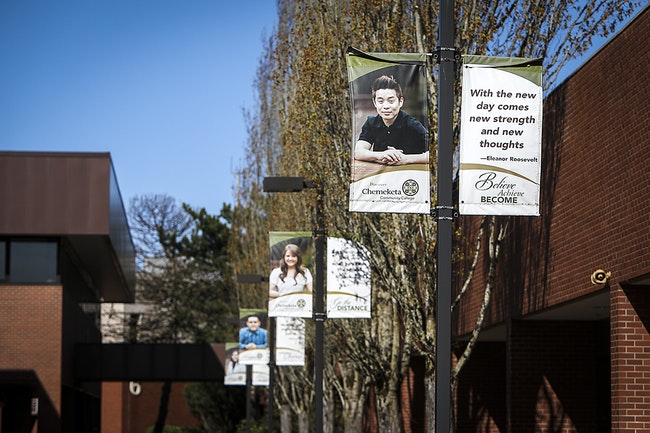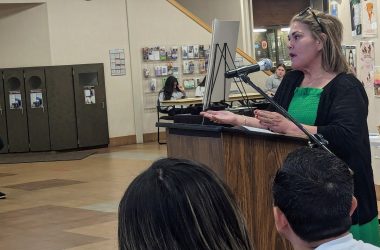 Chemeketa Community College on Thursday, April 16, 2020. (Amanda Loman/Salem Reporter)
Chemeketa Community College on Thursday, April 16, 2020. (Amanda Loman/Salem Reporter)
One year ago, Chemeketa Community College instructors and staff moved more than 1,600 scheduled courses online with just two weeks’ notice.
But about 2,000 students opted not to follow. So far, they haven’t come back.
College President Jessica Howard is counting on the college’s adaptability as she looks ahead to the fall, which will likely mark the return of to nearly normal on-campus classes.
“I see a lot of opportunities here, but I do think it’s going to be a different world,” Howard said.
The road ahead for Chemeketa and Oregon’s other community colleges is uncertain as they face sharply reduced enrollments and budget constraints – both longstanding challenges exacerbated by the pandemic.
Community colleges typically see enrollment increase during recessions as people unemployed or underemployed seek training to help them switch careers or get better jobs.
But across Oregon, community college enrollment has stayed nearly flat after a sharp drop last spring.
“Enrollment has declined and stayed down despite the weak economy,” said Amy Cox, director of the state Higher Education Coordinating Commission’s Office of Research and Data. “That’s particularly concerning to us because it suggests that families may not even be able to afford to do that upskilling.”
Statewide, Oregon’s community colleges shed nearly one-quarter of their students from the fall of 2019 to the fall of 2020. The decline was so dramatic that for the first time, Oregon’s four-year public university students outnumbered community college students last fall, commission data shows.
The drop comes on the heels of years of declining enrollment since the Great Recession.
Chemeketa fared better, going from about 11,900 students enrolled in fall 2019 to 9,800 last fall – a 17% drop.
Most of that drop was immediate, Howard said, likely reflecting students who didn’t want to attend college online.
Winter quarter saw 10,064 students enrolled at Chemeketa.
Howard said spring quarter, which began this week, has about the same enrollment as last year.
“I don’t think we’ve seen them come back,” Howard said of the students who departed last spring.
Across Oregon, students in career and technical education programs were especially likely to drop out last spring, Cox said. Chemeketa saw the same trend.
Cox said that’s likely because the hands-on learning that attracts students to certificates in phlebotomy or truck driving can’t be replicated remotely.
“It’s hard to teach someone how to draw blood online,” she said.
Enrollment declines mean less money for colleges, both because of lost tuition revenue and because state funding is paid by the number of students enrolled.
Three federal pandemic relief packages have included aid to Oregon community colleges, totaling about $318 million statewide, said Jim Pinkard, director of postsecondary finance and capital for the Higher Education Coordinating Commission.
A portion of that money was earmarked for direct aid to struggling students, leaving about $191 million for colleges to cover lost revenue and increased operating expenses.
Chemeketa used the money to mail textbooks from the library directly to students, sent lab kits home for some courses and provided additional grants to students, spending about $608,000 in the final quarter of 2020, according to a federal report.
Pinkard said much of the money from the most recent relief packages remains to be distributed, and it’s not yet clear how far it will go toward covering lost revenue.
“It may or may not be enough to pay for the total financial impact,” he said.
Much about the next two years depends on how much legislators now meeting in session allocate to community colleges. Gov. Kate Brown proposed flat funding for 2021-23 even though college costs are going up.
Chemeketa’s Board of Education in February approved a tuition increase to take effect in the fall, though the amount depends on what legislators ultimately budget.
Howard said that before the pandemic Chemeketa was adding programs targeted toward working adults hoping to improve employment prospects. A recent addition in the fall of 2019 was a truck driving program, setting up students to get a commercial driver’s license.
Howard said those programs will become more critical to aid in economic recovery and attract students as face-to-face instruction returns in the fall.
“Coming out of a recession, community colleges are your economic first responders,” she said.
Attracting those students will also depend on what financial help they can get from the government to cover tuition and other costs. Federal Pell grants, a key source of funding for students who otherwise could not afford college, can’t be used for short-term training or certificate programs.
The college will keep some changes made during the pandemic, including giving students the option for virtual advising and other appointments, rather than having to come to campus.
Howard said the academic challenges high school students faced with a year of online school may mean more young adults seeking out community college courses in the near future to fill gaps or brush up on skills.
Chemeketa is also working to create an agriculture program that would allow students to start at Chemeketa and finish with a four-year degree at Oregon State University.
Driver’s education courses are also returning this summer, giving teens who have been stuck at home a chance to get behind the wheel.
“We demonstrated last March that we could be very flexible and very innovative,” Howard said. “If we can do that, we can really modulate to meet the needs of a changing world and that’s what we intend to do.”
Contact reporter Rachel Alexander: [email protected] or 503-575-1241.
Salem Reporter counts on community support to fund vital local journalism. You can help us do more.
SUBSCRIBE: A monthly digital subscription starts at $5 a month.
GIFT: Give someone you know a subscription.
ONE-TIME PAYMENT: Contribute, knowing your support goes towards more local journalism you can trust.

Rachel Alexander is Salem Reporter’s managing editor. She joined Salem Reporter when it was founded in 2018 and covers city news, education, nonprofits and a little bit of everything else. She’s been a journalist in Oregon and Washington for a decade. Outside of work, she’s a skater and board member with Salem’s Cherry City Roller Derby and can often be found with her nose buried in a book.









